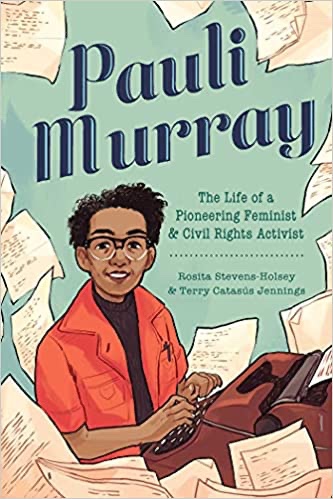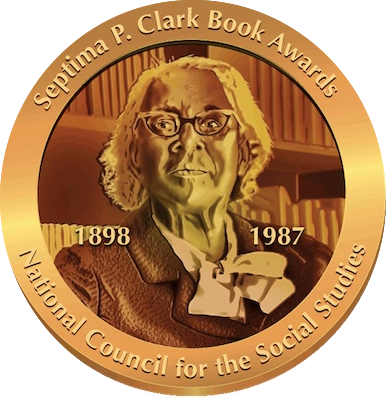Terry Catasús Jennings
Middle Grade biography in verse about the queer, black feminist who figured out what it took to win Brown v. Board of Education, but never got the credit for it. She insured that women's rights were included in the 1964 Civil Rights Acts. She was a lawyer, a poet and a priest. She and her typewriter pricked the consciences of presidents and lawmakers. She was transformative.
And now her story will be available to young readers.
Classroom Materials and Resources
Pauli Murray was an amazing individual who caused change by what she called her "confrontations by typewriter."She was a thorn on the side of white America [of Franklin Roosevelt and subsequent presidents] demanding justice and equal treatment for all.
She refused to sit in a broken seat in the back of a bus in 1940, fifteen years before Rosa Parks. She went to jail for it. She organized student sit-ins to integrate cafeterias in Washington, DC in 1943, seventeen years before the Greensboro sit-ins.
She was a civil rights and women’s rights activist before any movement advocated for either—the brilliant mind that, in 1944, conceptualized the arguments that would, ten years later, win Brown V. Board of Education of Topeka Kansas, and in 1964, the arguments that won women equality in the workplace. Throughout her life, she fought for the oppressed, not only through changing laws, but by using her powerful prose to influence those who could effect change. She lived by her convictions and challenged authority to demand fairness and justice regardless of the personal consequences. Without seeking acknowledgement, glory, or financial gain for what she did, Pauli Murray fought in the trenches for many of the rights we take for granted. Her goal was human rights and the dignity of life for all.
She was a lawyer, a poet, and in the end, a priest. She was not adequately recognized for her contributions while she was alive, but she was transformative.
Below are classroom materials and links to many documents relevant to Pauli's Life, the history of civil rights, the Jim Crow Era, the history of women's rights.
Power Point Presentations:
(may take a few min to load)
REVIEWS:
"This is a compelling biography of an 'unsung force'-an inspiring and transformative figure who broke barriers pivotal to both the civil rights and women's movements."--Horn Book Magazine
"This inspiring biography in verse aims to promote the life and work of the lesser-known yet influential Black civil rights activist and feminist."--Booklist Reviews
"Pauli Murray was brilliant, outspoken, and committed to achieving dignity and equality for all under the law. Rising from poverty, Murray challenged pervasive race and sex discrimination and helped launch the two most important movements of the Twentieth Century: civil rights and women's rights. This new biography capsulizes important events and accomplishments of an iconoclast who would not take 'No' for an answer. Young readers will be drawn to the story of Pauli's bravery and pivotal role in history." -- Christian F. Nunes, President, National Organization for Women
“…the inclusion of too-often-unrecognized details of Murray’s accomplishments in education, law, and activism, combined with the harsh sociopolitical context she emerged from, make for an undeniably potent story.” — Kirkus
"Pauli Murray is told in verse, giving poetic gravitas to her life from her early childhood; the early death of her mother and separation of the siblings, which saw Pauli Murray move to Baltimore to live with her aunt, who eventually adopted her; her life in the Jim Crow South, which awakened the activist in her, and her work to dismantle the white male patriarchy that sought to “other” her and hold her, and other women and people of color, down. Queer and Black, she was a force for positive change. She went to jail for refusing to sit in a broken seat in the back of a bus long before Rosa Parks, and, like Martin Luther King Jr., was inspired by Ghandhi’s promotion of protest through nonviolence." -- @momreadit.com, May 28,2022
Pauli Murray: The Life…is perhaps most notable for the literary device of telling the story in verse – singing, it seems, of the unvarnished hardships, and the horrific indignities of poverty Murray had to endure as a direct result of oppression. The narrative unfolds gracefully with fluidity and lyricism almost easing the telling of alarming gritty details. Actually, the great achievement of the writing here is that the reader is carried almost effortlessly through the ugliness of what she endured – the girls’ camp protest that ended in her dismissal, the bare-bones – just merely better than a life-on-the-streets-existence in New York, and her courageous trek from California to North Carolina on freight trains while disguised as a boy. Then there is the long list of offered opportunities that were later denied or had suddenly vanished because she was not male or white, or neither. Riley Temple, Virginia Theological Seminary
Collection Growth Specialist for the African American Episcopal Historical Collection.
This is an enthralling telling of Pauli Murray’s life written by her niece Rosita Stevens-Holsey and by Terry Catasús Jennings. They write Murray’s story in an accessible manner intended for middle-school readers—though older readers will also be inspired! Following the example of Rev. Murray’s profound poetry, the biography is written in verse, such that Murray’s life jumps off the page into our hearts and souls. Murray’s life is a testimony to persistent longing for justice and keeping hope amid adversity. When the doctoral summer residency celebrated Pauli Murray’s feast day last summer, Stevens-Holsey generously came to campus to offer greetings from the Murray family. Her presence was a wonderful gift, as is her book! Virginia Theologic Seminary January 2023 Alumni News.
FOR YOUNGER STUDENTS.
FOR OLDER STUDENTS.
FURTHER READING
BOOK TRAILER
Podcasts and Interviews
Writing for Your Life
Dr. Melissa Harris-Perry Interviews Co-Authors














